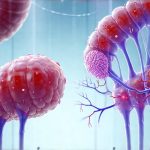Irritable Bowel Syndrome (IBS) is a common gastrointestinal disorder characterized by abdominal pain, bloating, gas, diarrhea, and constipation, often occurring in varying combinations. It significantly impacts quality of life for many individuals, leading to discomfort, anxiety, and social limitations. While traditionally viewed as a purely digestive issue, growing research highlights complex connections between IBS and mental health conditions, particularly eating disorders. Understanding this relationship is crucial for comprehensive care and effective treatment strategies.
The interplay between the gut and brain – often referred to as the gut-brain axis – plays a central role in both IBS and eating disorder development and maintenance. This bidirectional communication system means that psychological states can influence digestive function, and conversely, gastrointestinal distress can affect mood and emotional wellbeing. For individuals struggling with disordered eating, this connection is frequently exacerbated, creating a cycle of symptom exacerbation and increased distress.
The Complex Relationship Between IBS and Eating Disorders
The overlap between IBS and eating disorders isn’t simply coincidental. Studies reveal higher rates of IBS symptoms among individuals with eating disorders compared to the general population, and conversely, an elevated prevalence of disordered eating behaviors in those diagnosed with IBS. This suggests a strong association that goes beyond mere comorbidity. The reasons for this link are multifaceted and involve biological, psychological, and social factors.
The restrictive nature of many eating disorders can directly impact gut health and contribute to IBS-like symptoms. Rapid changes in diet, purging behaviors, and chronic stress all disrupt the delicate balance of the digestive system, potentially leading to visceral hypersensitivity – an increased sensitivity to pain within the gut.
Contributing Factors
Biological Vulnerabilities
Genetic predisposition plays a role in both IBS and eating disorders, suggesting shared biological vulnerabilities. Research indicates that individuals with a family history of either condition are at higher risk of developing it themselves. Furthermore, alterations in gut microbiota – the community of microorganisms residing in the digestive tract – have been implicated in both conditions. Dysbiosis, an imbalance in gut bacteria, can contribute to increased intestinal permeability (“leaky gut”), inflammation, and altered brain function, potentially worsening symptoms for those with IBS or making them more susceptible to disordered eating patterns.
Psychological Factors & Body Image
Anxiety, depression, perfectionism, and low self-esteem are common features of both IBS and eating disorders. Individuals struggling with these psychological factors may turn to restrictive eating or other disordered behaviors as a way to cope with difficult emotions or regain a sense of control. The intense focus on body image often seen in eating disorders can also contribute to gastrointestinal distress, as individuals may engage in extreme dieting or purging practices in an attempt to achieve unrealistic beauty standards. This creates a vicious cycle where the fear of weight gain and negative body image fuel disordered behaviors which then exacerbate digestive symptoms.
Control & Coping Mechanisms
For some individuals, disordered eating can become a maladaptive coping mechanism for managing anxiety related to food or bodily sensations. The rigid rules and routines associated with restrictive diets or purging rituals may provide a temporary sense of control when other areas of life feel chaotic or overwhelming. Similarly, IBS symptoms themselves can trigger anxiety and fear, leading to avoidance behaviors around food or social situations – further reinforcing the disordered eating patterns. This is especially prominent in individuals who interpret normal bodily sensations as signs of illness or impending weight gain.
It’s important to remember that the relationship between IBS and eating disorders isn’t always straightforward. Some individuals may develop an eating disorder before experiencing IBS symptoms, while others might find their digestive issues worsen alongside disordered behaviors. In still other cases, both conditions may develop concurrently. Regardless of the order, recognizing this connection is essential for providing holistic and compassionate care. Treatment approaches need to address both the physical and psychological aspects of these intertwined conditions, often involving a multidisciplinary team including gastroenterologists, therapists specializing in eating disorders, registered dietitians, and potentially other healthcare professionals. A collaborative approach that prioritizes patient wellbeing and individualized treatment plans is crucial for achieving lasting recovery.


















